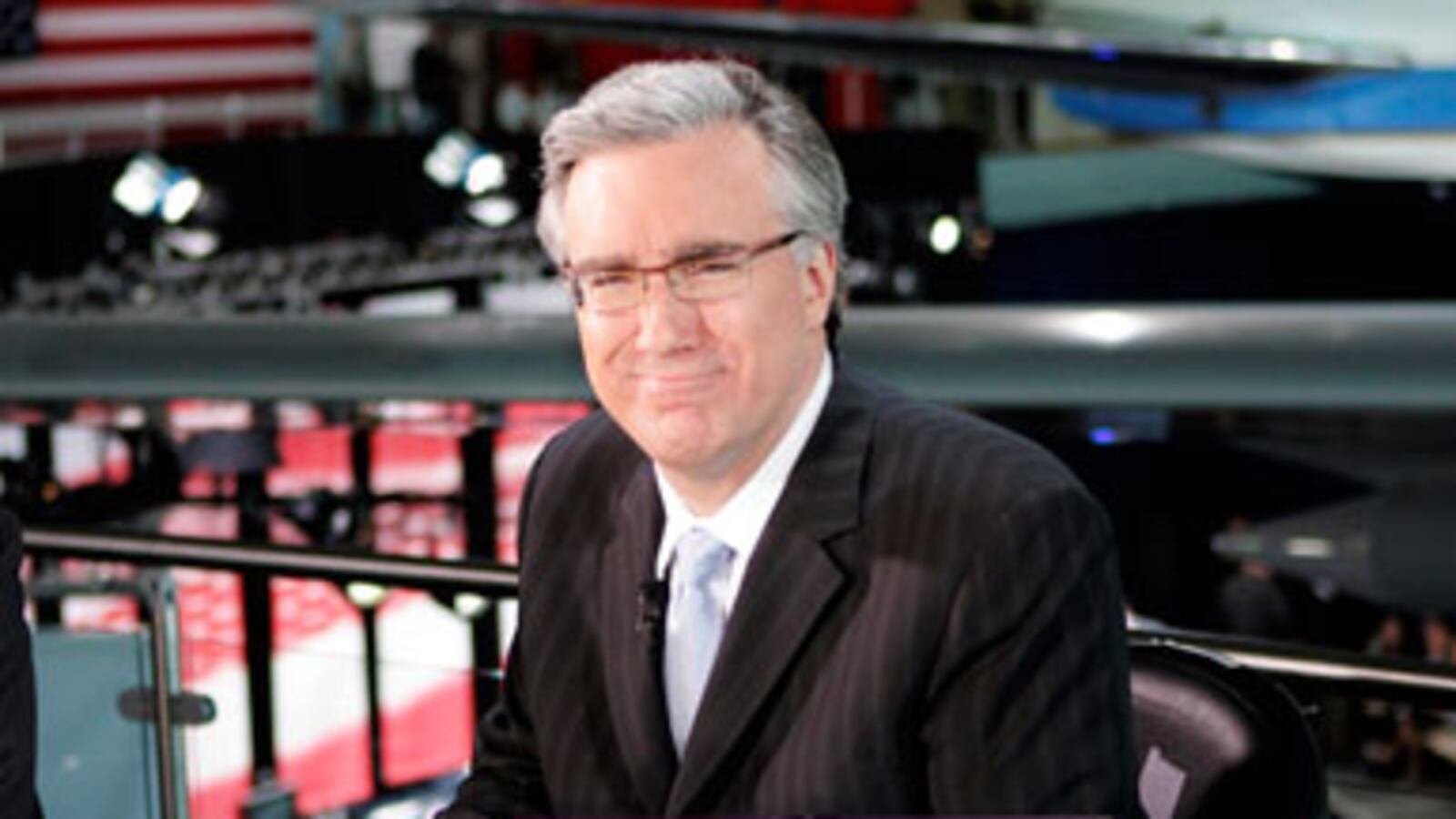Keith Olbermann’s suspension didn’t last long.
He will be back hosting MSNBC’s Countdown on Tuesday night, having missed all of two programs.
The liberal commentator caused a media furor by donating the maximum $2,400 to three Democratic candidates in the final weeks of the campaign—and sparked a fascinating debate about how far news channel personalities should be able to go in pursuit of partisanship. MSNBC President Phil Griffin suspended his biggest star for flouting network rules against making political contributions. But Griffin issued this statement Sunday night:

“After several days of deliberation and discussion, I have determined that suspending Keith through and including Monday night's program is an appropriate punishment for his violation of our policy. We look forward to having him back on the air Tuesday night.”
Olbermann, who had been uncharacteristically quiet, tweeted the following on Sunday: “Greetings From Exile! A quick, overwhelmed, stunned THANK YOU for support that feels like a global hug.”
The suspension prompted some overheated speculation that Olbermann might be fired or resign, both of which seemed unlikely for a man in the midst of a four-year, $30-million contract. Olbermann supporters said that commentators should be able to make political donations and that the situation was more egregious at Fox News, where Sean Hannity, Karl Rove and Dick Morris have raised money for Republican candidates or conservative groups. Fox, however, does not prohibit such activity by contributors and talk show hosts.
Politico, citing unnamed sources, said Olbermann was suspended—“indefinitely” was the original description—after refusing to make a public apology.
It’s still hard for me to understand why Olbermann made these donations, knowing full well they’d eventually emerge in federal election records—and knowing he was kicking in cash to Raul Grijavla’s campaign on the same day he was interviewing the Arizona congressman. It’s not like it was enough money to make a difference in any of the races; it was more of a statement.
Olbermann is smart, talented and has a well-documented tendency to clash with his bosses. When he was with ESPN in 1997, he was suspended for two weeks for appearing on the Daily Show and referring to the sports channel’s Bristol, Conn. headquarters as a “Godforsaken place.”
He soon left to join MSNBC, where he launched The Big Show with Keith Olbermann. When it turned into a nightly obsession with the Monica Lewinsky scandal, he made a speech saying the story gave him the “dry heaves” and his role in it would “make me ashamed, make me depressed, make me cry.”
Olbermann quit and wound up at Fox Sports, where he was fired in 2001—because, he claims, he reported on rumors that Fox boss Rupert Murdoch was planning to sell the Los Angeles Dodgers. Murdoch’s eventual explanation: “I fired him…He’s crazy.”
But not so crazy that he couldn’t get media outlets to rehire him. Olbermann returned to MSNBC in 2003, where Countdown began as an irreverent news program and later morphed into an hour of unbridled liberalism and Republican-bashing, sometimes tinged with anger. Keith would proclaim his nightly Worst Persons of the World, pulling the plug on that segment only last week after Jon Stewart criticized him, along with the likes of Glenn Beck, at the comedian’s Washington rally.
In short, the same passions that have made Olbermann a hero on the left have also made him a royal pain for his superiors—including Griffin, who began working with him when they were sports guys at the fledgling network CNN in the early 1980s.
The latest flareup has sparked a substantive argument over whether networks should place any limits on their opinion-mongers. It’s hardly a surprise that Olbermann favors Democrats, right? And Fox seems to have no problem with Hannity headlining GOP fundraisers—or interviewing Rep. Michele Bachmann after donating to her campaign—as Rachel Maddow pointed out in a heartfelt defense of her colleague. Fox contributor and Weekly Standard Editor Bill Kristol took Keith’s side, writing: “He’s not a reporter. It’s an opinion show. If Olbermann wants to put his money where his mouth is, more power to him.”
I happen to believe there ought to be boundaries. Commentators are still functioning in a journalistic role; Olbermann, in fact, was MSNBC’s lead anchor on Election Night (joined by fellow libs Maddow, Chris Matthews, Lawrence O’Donnell and Eugene Robinson). Any argument about their constitutional rights is fatuous; you give up certain rights in exchange for a journalistic soapbox.
And if it’s all right for commentators to give money to the politicians they cover, is it also okay to help them prepare for a debate (as George Will famously did with Ronald Reagan in 1980 before praising his performance)? At what point do they cease to be observers and become nakedly partisan players?
Olbermann says he hadn’t made political donations before; perhaps this was a single instance of flawed judgment. I look forward to hearing his explanation once he comes off the bench.
In the end, MSNBC made its point that Olbermann had to play by the same rules as everyone else—but without keeping him off the air for very long.
Howard Kurtz is The Daily Beast's Washington bureau chief. He also hosts CNN's weekly media program "Reliable Sources," Sundays at 11 am ET. The longtime media reporter and columnist for The Washington Post, Kurtz is the author of five books.






